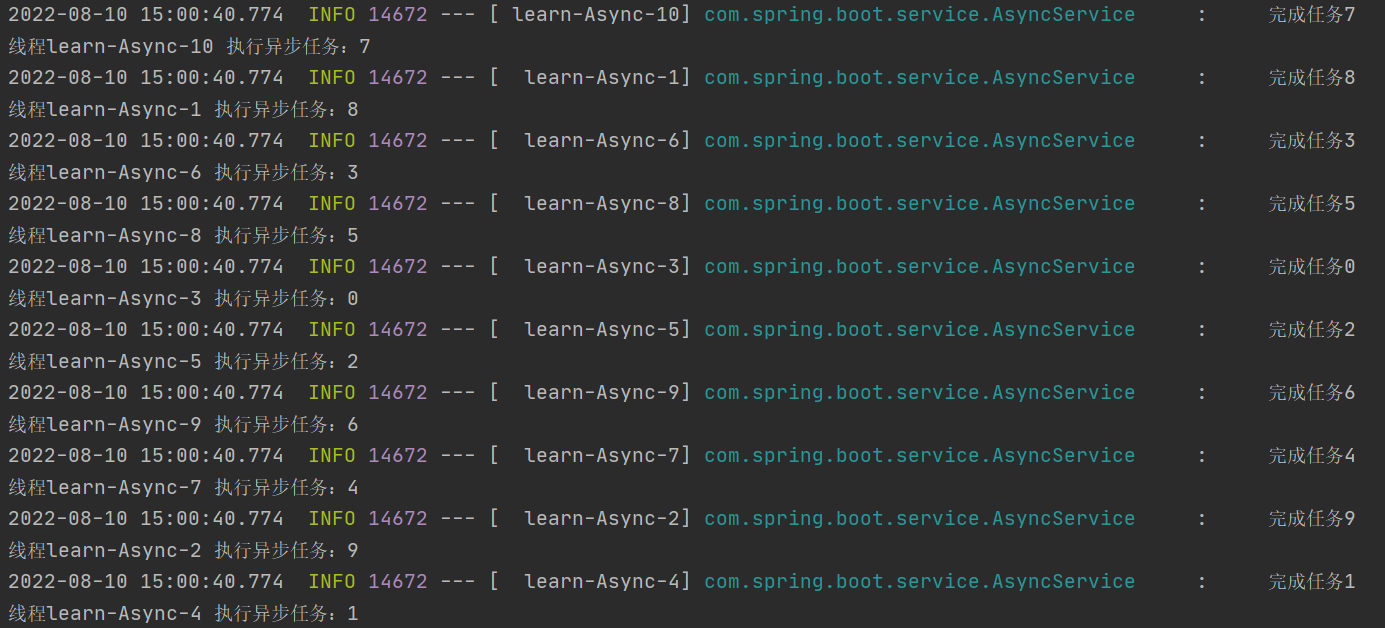原文链接
代码地址:https://github.com/Snowstorm0/learn-async
1 线程同步和异步
线程同步:A线程要请求某个资源,但是此资源正在被B线程使用中,因为同步机制存在,A只能等待下去。耗时较长,安全性较高。
线程异步:A线程要请求某个资源,但是此资源正在被B线程使用中,因为没有同步机制存在,A线程仍然请求的到。
一个进程启动的多个不相干的进程,他们之间的相互关系为异步;同步必须执行到底后才能执行其他操作,异步可同时执行。
多个线程执行的时候需要同步,如果是单线程则不需要同步。
2 异步实例
主方法和被调用的方法必须是不同的类,才能实现多线程。
2.1 启动类
使用
@EnableAsync
来开启 SpringBoot 对于异步任务的支持。
Application:
@SpringBootApplication@EnableAsyncpublicclassApplication{publicstaticvoidmain(String[] args){SpringApplication.run(Application.class, args);}}
2.2 线程池
配置类实现接口AsyncConfigurator,返回一个ThreadPoolTaskExecutor线程池对象。
config/AsyncConfig:
@Configuration@EnableAsyncpublicclassAsyncConfigimplementsAsyncConfigurer{// ThredPoolTaskExcutor的处理流程// 当池子大小小于corePoolSize,就新建线程,并处理请求// 当池子大小等于corePoolSize,把请求放入workQueue中,池子里的空闲线程就去workQueue中取任务并处理// 当workQueue放不下任务时,就新建线程入池,并处理请求,如果池子大小撑到了maximumPoolSize,就用RejectedExecutionHandler来做拒绝处理// 当池子的线程数大于corePoolSize时,多余的线程会等待keepAliveTime长时间,如果无请求可处理就自行销毁@Override@BeanpublicExecutorgetAsyncExecutor(){ThreadPoolTaskExecutor executor =newThreadPoolTaskExecutor();// 核心线程数:线程池创建的时候初始化的线程数
executor.setCorePoolSize(10);// 最大线程数:线程池最大的线程数,只有缓冲队列满了之后才会申请超过核心线程数的线程
executor.setMaxPoolSize(100);// 缓冲队列:用来缓冲执行任务的队列
executor.setQueueCapacity(50);// 线程池关闭:等待所有任务都完成再关闭
executor.setWaitForTasksToCompleteOnShutdown(true);// 等待时间:等待5秒后强制停止
executor.setAwaitTerminationSeconds(5);// 允许空闲时间:超过核心线程之外的线程到达60秒后会被销毁
executor.setKeepAliveSeconds(60);// 线程名称前缀
executor.setThreadNamePrefix("learn-Async-");// 初始化线程
executor.initialize();return executor;}@OverridepublicAsyncUncaughtExceptionHandlergetAsyncUncaughtExceptionHandler(){returnnull;}}
2.3 controller
通过该层调用测试 Async。
@RestController@RequestMapping("/homepage")publicclassAsyncController{@AutowiredAsyncService asyncTaskService;@GetMapping("/learnAsync")publicStringlearnAsync(){for(int i =0; i <10; i++){
asyncTaskService.executeAsyncTask(i);}return"1";}}
2.4 service
通过
@Async
注解表明该方法是异步方法,如果注解在类上,那表明这个类里面的所有方法都是异步的。
@ServicepublicclassAsyncService{privatefinalstaticLogger logger =LoggerFactory.getLogger(com.spring.boot.service.AsyncService.class);@Async// 表明该方法是异步方法。如果注解在类上,那表明类里面的所有方法都是异步publicvoidexecuteAsyncTask(int i){
logger.info("\t 完成任务"+ i);System.out.println("线程"+Thread.currentThread().getName()+" 执行异步任务:"+ i);}}
2.5 输出

3 Future 类
修改service层,分别使用同步调用、异步调用无返回、异步调用使用 Future 返回。
3.1 同步调用
publiclongsubBySync()throwsException{long start =System.currentTimeMillis();long sum =0;long end =System.currentTimeMillis();
sum = end - start;return sum;}
3.2 异步调用无返回
@AsyncpublicvoidsubByVoid()throwsException{long start =System.currentTimeMillis();long sum =0;long end =System.currentTimeMillis();
sum = end - start;}
3.3 异步调用 Future 返回
controller:
Future<Long> task = asyncTaskService.subByAsync();
service:
@AsyncpublicFuture<Long>subByAsync()throwsException{long start =System.currentTimeMillis();long sum =0;long end =System.currentTimeMillis();
sum = end - start;returnnewAsyncResult<>(sum);}
4 CompletableFuture 类
若使用 Future 出现报错:
无法判断org.springframework.scheduling.annotation.AsyncResult<>的类型参数
不存在类型变量V的实例,使org.springframework.scheduling.annotation.AsyncResult符合XXX
可以使用 CompletableFuture 类:
@AsyncpublicCompletableFuture<Map<String,Object>>subByAsyncMap()throwsException{Map<String,Object> res =newHashMap<>();returnCompletableFuture.completedFuture(res);}
5 线程关闭
当线程数量超过核心线程数量之后,运行完毕的旧的线程会被关闭。
可以通过定时任务测试。
batch/ScheduledTaskService:
@Component@EnableSchedulingpublicclassScheduledTaskService{@AutowiredAsyncService asyncService;@Scheduled(cron ="1/1 * * * * ? ")//1s一次publicvoidlearnCron(){
asyncService.learnScheduledAsync();}}
在 AsyncService 添加方法:
// 使用定时任务调用此方法创建线程@AsyncpublicvoidlearnScheduledAsync(){Long timeLong =System.currentTimeMillis();SimpleDateFormat timeFormat =newSimpleDateFormat("yyyy-MM-dd HH:mm:ss");//设置格式String timeString = timeFormat.format(timeLong);System.out.println("线程"+Thread.currentThread().getName());System.out.println("timeString:"+ timeString +"\n");}
在异步配置(AsyncConfig)中已设置核心线程数为10:
// 核心线程数:线程池创建的时候初始化的线程数
executor.setCorePoolSize(10);
运行可以观察输出,线程数达到10后会再一次从1开始。
学习更多编程知识,请关注我的公众号:
代码的路

版权归原作者 代码的路 所有, 如有侵权,请联系我们删除。